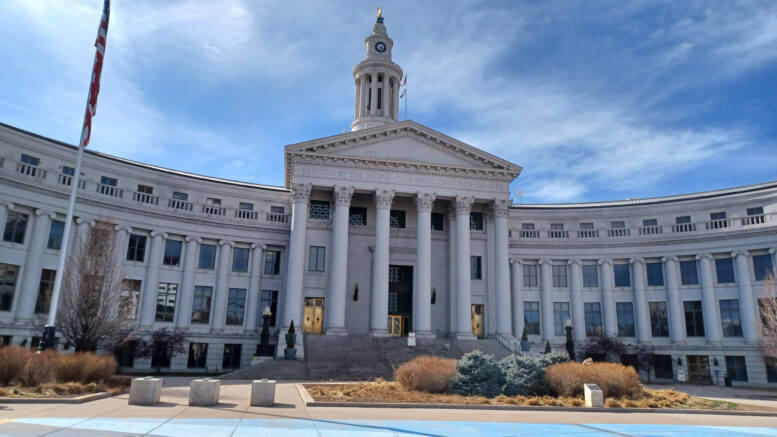Denver voters will begin casting ballots this week to elect their next mayor. And while those residents represent just 12% of the state’s population and skew more liberal than Colorado as a whole, their decision could send a far-flung message on homelessness and public safety.
A poll commissioned last month by a new businessmen-led organization called A Denver for Us All found that residents across the political spectrum, income levels and age groups believe that those two issues — particularly homelessness — are the key to this election. Some leading mayoral candidates have been sharpening their focus on finding solutions to homelessness over the past month as this tilt has become more apparent, and cities across the state are watching the results of the April 4 election in preparation for their fall ballots.
It should come as little surprise that homelessness and crime are important issues, as both have risen in the public consciousness as the number of individuals experiencing homelessness has gone up and crime has increased in the three years since the start of the coronavirus pandemic. The Common Sense Institute found in comparing several studies that Denver’s homeless population rose 44% between 2016 and 2021 — 12 times faster than the city’s overall population growth — and the Denver Business Journal used police data to determine that violent and property crimes increased 50% during that same time period.
Denver is not alone in this area; both crime and homelessness are up across the state, causing the Colorado Legislature to delve more into two areas that often have been considered local issues. But the city’s high visibility, combined with the fact that Denver voters will choose municipal leaders for the first time since 2019, is putting an increased focus on this election well beyond the city’s boundaries.

Boarded windows, as well as individuals taking shelter in doorways of unoccupied commercial buildings, have become more common in Denver.
Eye-opening poll results
And so is this statistic: 96% of Denver voters consider homelessness either a crisis (46%) or a major problem (49.9%), according to the poll conducted for the new organization by Democratic polling firm Chism Strategies and Republican polling firm Cygnal. Crime and public safety slightly (29.9%) slightly outpolled homelessness (25.2%) as the top issue, but the lesser intensity of voters’ feelings on public safety— 21.5% called it a crisis and 52.2% a major problem — led pollsters to say that the mayoral race may be determined by whichever candidate’s homelessness plan resonates most with voters.
“While we have almost two conversations going on right now in the mayor and council races, voters are focused on homelessness,” said Brent Buchanan, president and founder of Washington D.C.-based Cygnal, which works in 49 states, including Colorado. “They’re not satisfied with the ‘Let’s be compassionate’ approach right now.”
To that point, the poll found that 57% of voters support the homeless-camp “sweeps” that have produced both litigation and public criticism. Support levels ran at 82% among Republicans (admittedly a small population in Denver), 64% among unaffiliated voters and 48% among Democrats, and they received at least 10 points more support than opposition from non-white residents and from anyone who’s voted in one of the past four city elections.
This heightened attention to the issue of homelessness has seemed to resound in mayoral-candidate discussions. Former state Sen. Mike Johnston, who seemed focused on affordable housing after leading the campaign to pass Proposition 123 last year, said during the March 1 mayoral debate hosted by Colorado Restaurant Association and EatDenver that homelessness is the “single biggest issue in the city,” and several other candidates seemed to agree.

Fewer than 60% of the number of workers that came downtown on a daily basis pre-pandemic have returned, leading to lower crowds along the 16th Street Mall and struggles for some visitor-facing businesses in the Central Business District.
Candidate homelessness plans
Some candidates, particularly former Denver Metro Chamber of Commerce President/CEO Kelly Brough and businessman Andy Rougeot, have vowed to enforce the city’s outdoor-camping ban, which likely would lead to more sweeps and penalties against those who resist them. Other candidates, such as Tattered Cover owner Kwame Spearman, said the city must “enforce our laws,” signaling they too will make more effort to remove tents from sidewalks and other public spaces around town.
Brough has offered the idea of opening more and smaller shelters around town to make temporary occupants there feel safer. Johnston wants to build tiny-home villages of 40 to 60 structures in 10-20 places around town to keep communities of individuals together. State Sen. Chris Hansen wants to bring individuals experiencing homelessness more into safe outdoor spaces where they can put up shelters and come into contact more easily with social services.
Many candidates also are talking about increasing services to the population — sometimes in conjunction with moving tents out of the public rights-of-way and sometimes as a solution that should take priority over sweeps. City Councilwoman Debbie Ortega said she’d like to relocate many individuals temporarily to the former Ridge View Youth Services Center, where they can get treatment for substance-abuse and behavioral-health issues as well as learning job skills. State Rep. Leslie Herod said she wants to expand street outreach, addiction-treatment and harm-reduction strategies to reduce homelessness by getting at its underlying causes.
Reverberations beyond Denver
While several candidates have suggested a need to work more closely with surrounding cities on the issue, most are coming it as a Denver issue that needs a Denver solution.
But the Legislature last year approved bills that will allow for allocation of roughly $200 million in grants to local governments and organizations to fight homelessness. And it may not be long until it sees homelessness as a statewide issue in which it needs to play a more definitive role, much like Gov. Jared Polis is now viewing the shortage of homes as he prepares to roll out a plan that supersedes some local regulations in order to increase the housing supply.
Brad Chism, operator of Chism Strategies, said that what the polling for A Denver for Us All showed is that voters want on homelessness is “a muscular, proactive proposal that at least gets points for something new.” And in a race where none of the 17 candidates is breaking out yet with voters — and where a top-two finish needed to make the June 6 mayoral runoff may require less than 20% support next month — he predicted those who offer such a solution will benefit significantly.
“My hunch is that the candidates that articulate a message around this very important issue are going to move to the top,” Chism said.
And those candidates may well serve as examples to officials in other cities and throughout the state on what needs to be done to try to tackle this expanding issue.
